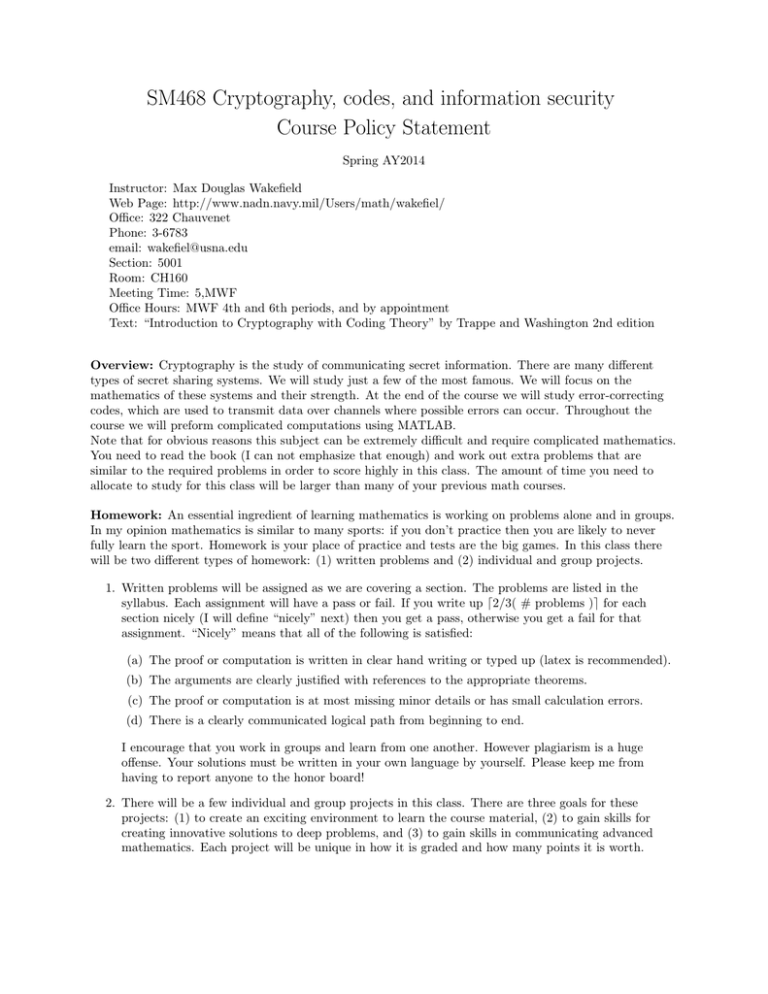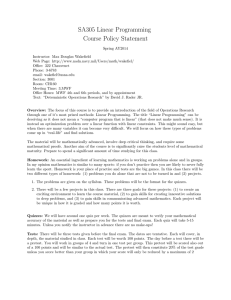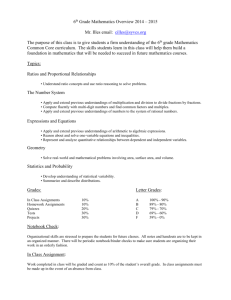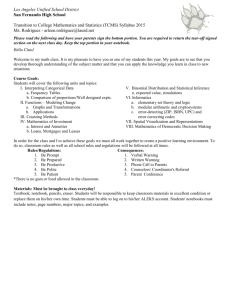SM468 Cryptography, codes, and information security Course Policy Statement
advertisement

SM468 Cryptography, codes, and information security Course Policy Statement Spring AY2014 Instructor: Max Douglas Wakefield Web Page: http://www.nadn.navy.mil/Users/math/wakefiel/ Office: 322 Chauvenet Phone: 3-6783 email: wakefiel@usna.edu Section: 5001 Room: CH160 Meeting Time: 5,MWF Office Hours: MWF 4th and 6th periods, and by appointment Text: “Introduction to Cryptography with Coding Theory” by Trappe and Washington 2nd edition Overview: Cryptography is the study of communicating secret information. There are many different types of secret sharing systems. We will study just a few of the most famous. We will focus on the mathematics of these systems and their strength. At the end of the course we will study error-correcting codes, which are used to transmit data over channels where possible errors can occur. Throughout the course we will preform complicated computations using MATLAB. Note that for obvious reasons this subject can be extremely difficult and require complicated mathematics. You need to read the book (I can not emphasize that enough) and work out extra problems that are similar to the required problems in order to score highly in this class. The amount of time you need to allocate to study for this class will be larger than many of your previous math courses. Homework: An essential ingredient of learning mathematics is working on problems alone and in groups. In my opinion mathematics is similar to many sports: if you don’t practice then you are likely to never fully learn the sport. Homework is your place of practice and tests are the big games. In this class there will be two different types of homework: (1) written problems and (2) individual and group projects. 1. Written problems will be assigned as we are covering a section. The problems are listed in the syllabus. Each assignment will have a pass or fail. If you write up d2/3( # problems )e for each section nicely (I will define “nicely” next) then you get a pass, otherwise you get a fail for that assignment. “Nicely” means that all of the following is satisfied: (a) The proof or computation is written in clear hand writing or typed up (latex is recommended). (b) The arguments are clearly justified with references to the appropriate theorems. (c) The proof or computation is at most missing minor details or has small calculation errors. (d) There is a clearly communicated logical path from beginning to end. I encourage that you work in groups and learn from one another. However plagiarism is a huge offense. Your solutions must be written in your own language by yourself. Please keep me from having to report anyone to the honor board! 2. There will be a few individual and group projects in this class. There are three goals for these projects: (1) to create an exciting environment to learn the course material, (2) to gain skills for creating innovative solutions to deep problems, and (3) to gain skills in communicating advanced mathematics. Each project will be unique in how it is graded and how many points it is worth. Quizzes: We will have 1 quiz per week (≈ Mondays). The quizzes are meant to verify your mathematical accuracy of the material as well as prepare you for the tests and final exam. Each quiz will take 5-15 minutes. Unless you notify the instructor in advance there are no make-ups! Tests: There will be two tests given before the final exam. The dates are tentative but will be around the 6 and 12 week grading periods. Each will cover, in depth, the material studied in class. Each test will be worth 100 points. If you notify me before hand that you can not attend the test then we can arrange an alternate time, otherwise there are no make ups. Final Exam: The final exam will be comprehensive. Calculator/Computer: No calculator will be used for this class. We will use MATLAB for many computations in the corse. Some of the code we will use can be found on the web page http://www2.math.umd.edu/ lcw/MatlabCode/. Please bring your laptops to class everyday. Grades: 6 week Grade content: Homework 40% Quizzes 25% Test 35% 12 week Grade content: Homework 40% Quizzes 20% Tests 40% Grade Percent Breakdown: 90-100 A 80-90 B 70-80 C 60-70 D 0-60 F Final Grade Content: Homework 40% Quizzes 15% Tests 25% Final Exam 20% End of Course Grade content: Homework 40% Quizzes 15% Tests 45%



